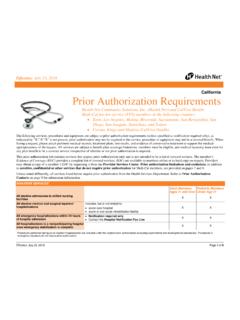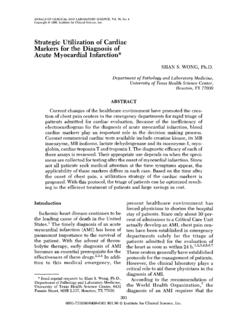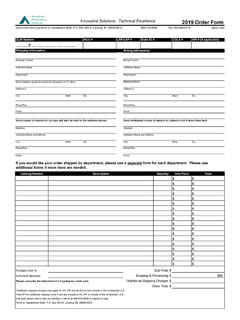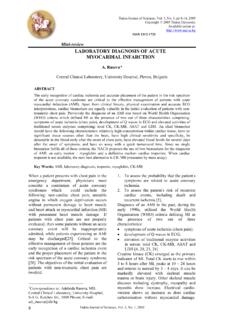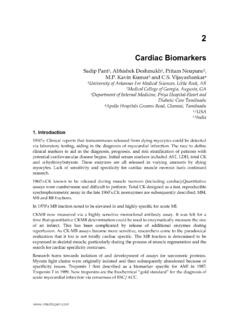Transcription of Clinical Policy: Cardiac Biomarker Testing
1 Page 1 of 4 Clinical Policy: Cardiac Biomarker Testing Reference Number: Coding Implications Last Review Date: 01/20 Revision Log See Important Reminder at the end of this policy for important regulatory and legal information. Description The release of Cardiac biomarkers is among the cascade of events that occur during acute coronary syndromes and Cardiac ischemia. This policy discusses the medical necessity requirements for Testing of these Cardiac biomarkers. Policy/Criteria I. It is the policy of health plans affiliated with Centene Corporation that troponin I or T Testing is medically necessary and the appropriate Cardiac Biomarker for evaluating for suspected acute myocardial infarctions (AMI). II. It is the policy of health plans affiliated with Centene Corporation that creatine kinase myocardial isoenzyme (CK-MB) and myoglobin Testing are not medically necessary in the evaluation for suspected AMI because troponin is the recommended Biomarker due to its superior sensitivity and accuracy.
2 Background Detection of specific Cardiac biomarkers in blood serum is a useful Clinical indication of AMI, myocarditis, or heart failure. According to the 2014 Clinical practice guideline of the American College of Cardiologists / American Heart Association, (ACC/AHA) Cardiac troponins have become the main biomarkers used for the diagnoses of acute coronary syndromes, specifically troponins I and T because these subunits are expressed in the ,2 Furthermore, troponin levels are also elevated for acute and chronic decompensated heart failure in instances of myocyte injury and/or Other Cardiac peptides that were previously assessed for AMI include CK-MB and myoglobin. However, recent evidence suggests that the sensitivity and specificity of these biomarkers are inferior compared to the troponins, suggesting that troponins are a more accurate Biomarker of myocardial According to the 2014 ACC/AHA Clinical practice guideline, CK-MB and myoglobin are no longer necessary for acute coronary syndrome diagnosis as a result of the advent of troponin CK-MB detection is comparatively less sensitive and less specific.
3 Voltz et al. performed a retrospective cohort study across 55,000 emergency department visits for AMI and examined their CK-MB and troponin levels with screenings; the authors concluded that CK-MB can be omitted during the initial screening of Eggers et al, evaluated the role of myoglobin with troponin I to detect AMI in a sample of 197 patients and determined that neither myoglobin nor CK-MB added Clinical diagnostic Aviles et al analyzed AMI amongst patients with elevated Cardiac troponins in a prospective cohort and noted that at least 20% of patients had normal CK-MB levels, thereby further questioning the validity of CK-MB as a valuable Cardiac Of note, Singh et al. measured CK-MB Testing from 2007 to 2013 and found a dramatic decrease from 12,057 tests in 2007 to 36 tests in Clinical POLICY Cardiac Biomarker Testing for Acute Myocardial Infarction Page 2 of 4 Coding Implications This Clinical policy references Current Procedural Terminology (CPT ).
4 CPT is a registered trademark of the American Medical Association. All CPT codes and descriptions are copyrighted 2020, American Medical Association. All rights reserved. CPT codes and CPT descriptions are from the current manuals and those included herein are not intended to be all-inclusive and are included for informational purposes only. Codes referenced in this Clinical policy are for informational purposes only. Inclusion or exclusion of any codes does not guarantee coverage. Providers should reference the most up-to-date sources of professional coding guidance prior to the submission of claims for reimbursement of covered services. Table 1: CPT codes not medically necessary when billed with CPT 84484 Troponin CPT Codes Description 82553 Creatine kinase (CK), (CPK); MB fraction only 83874 Myoglobin Reviews, Revisions, and Approvals Date Approval Date Policy developed 12/17 12/17 Deleted Table 2, diagnosis code list.
5 Clarified in criteria point II that CK-MB and myoglobin are not medically necessary when billed with 84484 troponin. Specialist reviewed 03/18 03/18 References reviewed and updated. 02/19 02/19 References reviewed and updated. Coding reviewed. 01/20 01/20 References 1. Amsterdam, Ezra A., et al. "2014 AHA/ACC guideline for the management of patients with non-ST-elevation acute coronary syndromes." Circulation (2014): 2. Neumann, Johannes Tobias, et al. "Diagnosis of myocardial infarction using a high-sensitivity troponin I 1-hour algorithm." JAMA Cardiology (2016): 397-404. 3. Yancy, Clyde W., et al. "2017 ACC/AHA/HFSA focused update of the 2013 ACCF/AHA guideline for the management of heart failure." Journal of Cardiac failure (2017): 628-651. 4. Eggers, Kai Marten, et al.
6 "Diagnostic value of serial measurement of Cardiac markers in patients with chest pain: limited value of adding myoglobin to troponin I for exclusion of myocardial infarction." American heart journal (2004): 574-581. 5. Singh, Gurmukh, and Paramdeep S. Baweja. "Creatine Kinase MB: The Journey to Obsolescence." American journal of Clinical pathology (2014): 415-419. 6. Volz, Kathryn A., et al. "Creatine kinase-MB does not add additional benefit to a negative troponin in the evaluation of chest pain." The American journal of emergency (2012): 188-190. 7. Aviles, Ronnier J., et al. "Long-term prognosis of patients with Clinical unstable angina pectoris without elevation of creatine kinase but with elevation of Cardiac troponin i levels." The American journal of cardiology (2002): 875-878.
7 8. Reeder GS, Kennedy HL. Diagnosis of acute myocardial infarction. UpToDate. Cannon CP, Hoekstra J, Jaffe AS (Ed). Accessed 2/6/19. Clinical POLICY Cardiac Biomarker Testing for Acute Myocardial Infarction Page 3 of 4 9. deFilippi C, Henrich WL. Serum Cardiac biomarkers in patients with renal failure. In: UpToDate. Berns JS, Jaffe AS (Ed). UpToDate, Waltham. Accessed 12/2/19. Important Reminder This Clinical policy has been developed by appropriately experienced and licensed health care professionals based on a review and consideration of currently available generally accepted standards of medical practice; peer-reviewed medical literature; government agency/program approval status; evidence-based guidelines and positions of leading national health professional organizations; views of physicians practicing in relevant Clinical areas affected by this Clinical policy; and other available Clinical information.
8 The Health Plan makes no representations and accepts no liability with respect to the content of any external information used or relied upon in developing this Clinical policy. This Clinical policy is consistent with standards of medical practice current at the time that this Clinical policy was approved. Health Plan means a health plan that has adopted this Clinical policy and that is operated or administered, in whole or in part, by Centene Management Company, LLC, or any of such health plan s affiliates, as applicable. The purpose of this Clinical policy is to provide a guide to medical necessity, which is a component of the guidelines used to assist in making coverage decisions and administering benefits. It does not constitute a contract or guarantee regarding payment or results.
9 Coverage decisions and the administration of benefits are subject to all terms, conditions, exclusions and limitations of the coverage documents ( , evidence of coverage, certificate of coverage, policy, contract of insurance, etc.), as well as to state and federal requirements and applicable Health Plan-level administrative policies and procedures. This Clinical policy is effective as of the date determined by the Health Plan. The date of posting may not be the effective date of this Clinical policy. This Clinical policy may be subject to applicable legal and regulatory requirements relating to provider notification. If there is a discrepancy between the effective date of this Clinical policy and any applicable legal or regulatory requirement, the requirements of law and regulation shall govern.
10 The Health Plan retains the right to change, amend or withdraw this Clinical policy, and additional Clinical policies may be developed and adopted as needed, at any time. This Clinical policy does not constitute medical advice, medical treatment or medical care. It is not intended to dictate to providers how to practice medicine. Providers are expected to exercise professional medical judgment in providing the most appropriate care, and are solely responsible for the medical advice and treatment of members. This Clinical policy is not intended to recommend treatment for members. Members should consult with their treating physician in connection with diagnosis and treatment decisions. Providers referred to in this Clinical policy are independent contractors who exercise independent judgment and over whom the Health Plan has no control or right of control.

